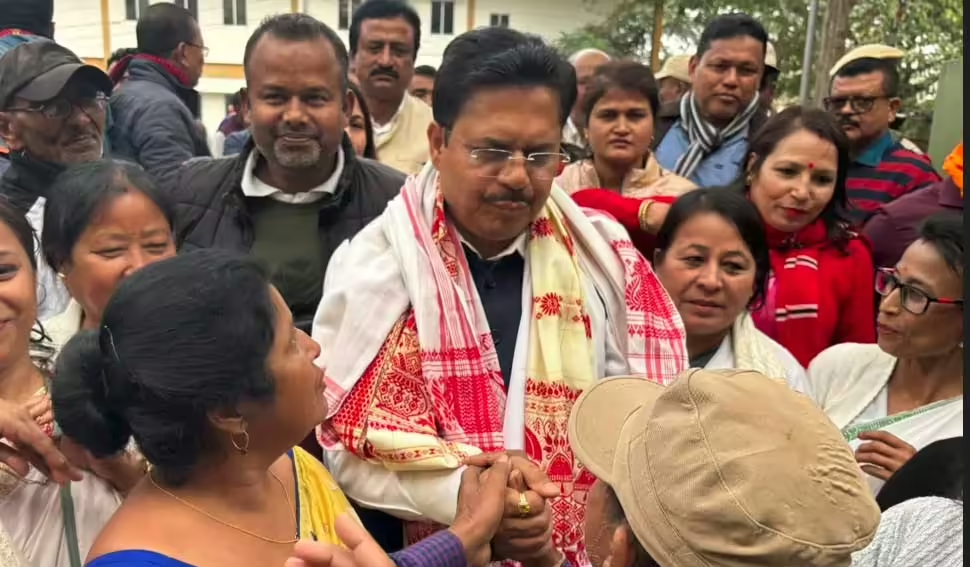Bhupen Borah challenges Himanta Biswa for judicial probe into the online trading scam

Assam Congress chief Bhupen Kumar Borah has publicly challenged Chief Minister Himanta Biswa Sarma to form a judicial commission, led by a sitting Supreme Court judge, to investigate the recent online trading scam in the state. Borah’s statement comes after Chief Minister Sarma announced on September 13 that 32 cases related to the scam would be handed over to the Central Bureau of Investigation (CBI) for further investigation.
During a press interaction, Borah criticized Sarma, claiming that the Chief Minister would not agree to a judicial commission because it would reveal “his true colours” and expose potential government involvement or oversight failures.
“The prime accused has connections with prominent figures, including a Union Minister and the Chief Minister’s sister-in-law,” Borah said and pointed to pictures showing the accused alongside these individuals, implying potential involvement or complicity.
“If a thorough investigation were conducted, it might reveal deeper connections and expose hidden wrongdoings, stating, “If he digs deep, skeletons from the cupboard might tumble out,” he also said.
In addition to his allegations, Borah announced that the Assam Pradesh Congress Committee (APCC) will stage protests across all district headquarters, demanding a judicial probe into the scam.
The Congress leader escalated his attack on the Chief Minister regarding the online trading scam, vowing not to let those responsible escape accountability.
“The Congress party would continue to organize protests across all districts, standing in solidarity with the victims of the scam. You should take cognizance of the victims. Who took the money, who collected it, and who are involved in the scam- everything should come out,” he also said.
Borah also accused the police of favouring the scam’s masterminds, alleging that they were receiving “VIP treatment” in police custody. He criticized Sarma’s leadership, claiming that the Chief Minister is not in control of the police, but rather the police are controlling him. “Where are you?” Borah questioned, directing his remarks at Sarma, and expressing doubts about the sincerity of the state’s efforts to address the scam.
Addressing the Sonapur eviction issue, Borah criticized the Chief Minister, stating that the Chief Minister lacks the moral authority to speak on evictions aimed at protecting land for indigenous communities. Borah accused Sarma of hypocrisy in handling such issues and questioned the motives behind the eviction drives.
Borah also commented on the protests that occurred during a Congress delegation’s visit, alleging that many of the protesters were former Congress members who had switched allegiance to the BJP. He pointed out that he recognized several individuals on TV, including the president of the Dispur Block Congress Committee (BCC), who had joined the BJP during the Lok Sabha elections.
The Congress leader continued his criticism of Chief Minister Sarma, particularly on the issue of evictions and the protection of indigenous communities.
Referring to the people of “Sil-Saku” as indigenous, Borah accused the Chief Minister of committing “untold atrocities” against them. He also invoked the controversial Citizenship Amendment Act (CAA), pointing out that the five individuals who were killed during the protests against the CAA were from indigenous communities, further emphasizing the government’s disregard for their rights.
Borah also questioned the Chief Minister’s handling of the Garukhuti eviction drive. While Sarma had claimed that the evictions were conducted under his direction to free encroached land, Borah criticized him for later rehabilitating the same people, calling the move contradictory and politically motivated.
The Congress leader also raised the issue of Assam’s land being under illegal occupation by neighbouring states, alleging that the Chief Minister had failed to take any meaningful action to reclaim it. Borah’s comments reflect his view that Sarma’s policies are inconsistent and selectively applied, particularly in matters involving indigenous communities and land protection.

Leave a Reply